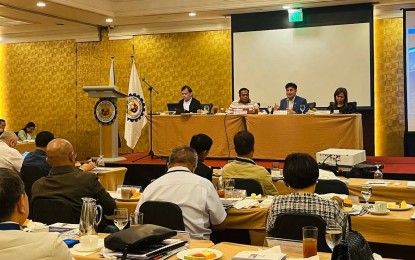
CLIMATE CHANGE RESILIENCE. Climate Change Commission Vice Chairperson and Executive Director Robert E.A. Borje (second from right) speaks at the 5th General Assembly of the League of Provinces of the Philippines on Tuesday (Aug. 29, 2023). He emphasized the importance of local climate change action plans in making vulnerable areas disaster resilient. (Photo courtesy of CCC)
MANILA – Local climate change action plans are important in providing actions and measures tailored to address unique problems in disaster-vulnerable areas, Climate Change Commission Vice Chairperson and Executive Director Robert E.A. Borje said.
In a news release on Wednesday, Borje said unified action is needed to address the widespread impacts of climate change especially among the 22 areas identified by the Cabinet Cluster on Climate Change Adaptation, Mitigation and Disaster Risk Reduction (CCAM-DRR) as most vulnerable to the phenomenon.
These include Metro Manila, Bulacan, Isabela, Davao del Sur, Leyte, Occidental Mindoro, Oriental Mindoro, Pangasinan, Ilocos Sur, Eastern Samar, Zambales, Aurora, Northern Samar, Cagayan, Surigao del Sur, Nueva Ecija, Tarlac, Sulu, Leyte, Pampanga, Samar and Southern Leyte.
The CCC reaffirmed its commitment to climate resilience through collaboration with local government units on local climate change action plans that aim to address the unique needs of vulnerable areas.
"These provinces face high poverty rates, critical watersheds, and susceptibility to climate hazards such as flooding, landslides, and droughts," Borje said.
"How can our LGUs, the real frontline warriors, amplify these climate actions? Our policies serve as roadmaps for LGUs, steering them towards resilience. To this end, the CCC and the Department of [the] Interior and Local Government actively champion the Local Climate Change Action Plans (LCCAP)."
The LCCAP provides actions and measures tailored to address the vulnerabilities of each locality.
The CCC supports LGUs in creating high-quality LCCAPs, which serve as crucial investment references for domestic financing mechanisms such as the People’s Survival Fund.
It also fosters collaboration with LGUs through initiatives like ACT Local (Accelerating Climate Action and Transformation for Local Communities).
Borje said LGUs should have the tools, knowledge and financial resources to enhance climate adaptation and mitigate the risks.
He outlined three key strategies for LGUs to amplify climate actions that include capacity-building, access to climate finance and multi-sectoral collaboration.
"There is (a) need for robust planning based on the best available science, indigenous and local knowledge, and up-to-date methodologies to project future changes and impacts," he said.
"The Commission, with its partners in the government and non-state stakeholders, will be ready to extend the necessary technical support to LGUs towards achieving the desired level of climate resilience, from national to local, and across all sectors of our society." (PNA)
